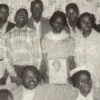Detroit — Two members of Detroit’s reparations task force have stepped down less than a year into their appointed positions, citing a “lack of progress”
Co-Chair Lauren Hood and Maurice Weeks, who represents southwest Detroit, resigned Saturday during the task force’s first public meeting since August.
Hood said she and Weeks were debating leaving the task force for months due to a combination of feeling discouraged about asking the City Council for support and the group “lacking a broad strategic vision.”
“I think, collectively, that group of people has different ideas about what reparations is fundamentally and we didn’t get to a place where we had a broad strategic vision,” Hood said. “I’m happy that we’re now getting things done. We’ve got some partners who can help us organize existing information that will help make decisions, but we also still desperately need a strategy for how we engage the public around this work.”
Hood said they needed to involve the public in their work and hear testimony from people who have experienced the harms they are attempting to address but there was no strategy for how to do it.
“We haven’t had a public meeting in a few months so the impetus was there just because we had a public opportunity to let folks know what was happening,” Hood said. “We had some concerns at the last meeting that we had and nothing really changed. So it’s just like, how long do you stay the course when you don’t see anything changing?”

The Detroit Reparations Task Force launched its first public meeting in April with 13 appointed members exploring ways to stop the deep institutional racism Black Detroiters have faced.
But with Hood’s and Weeks’ resignations, they now have 10 members and Rev. JoAnn Watson died in July. Detroit’s City Council members will have to recommend and vote on new appointments when sessions resume in the new year.

Task Force co-chair Keith Williams told The Detroit News Monday that while he wasn’t in attendance at Saturday’s meeting, he spoke his intentions Friday night, saying “the task at hand is bigger than two members.”
“To me, no one person is bigger than the mission of reparation because the mission should be about bringing relief to the thousands of Black people who suffer from racist practices of the past,” Williams said. “This is not the time to blame anyone because this is sacred work and we must finish the job that the citizens of Detroit voted for.”
The task force was created after Detroit voters overwhelmingly two years ago to approve creating a reparations effort focused on housing and economic initiatives. The goal is to develop short-, mid- and long-term recommendations, but the group has no legislative power.
The task force is required to submit a written report of its findings and recommendations to the City Council in 18 months or sooner. City Council President Mary Sheffield, who was a major force behind the effort, said the task force has been given a $350,000 budget, which will help finance the task force’s series of meetings throughout the city.
Sheffield, in a statement to The News Monday, said the taskforce was designed to not have City Council involved in day-to-day activities and instead be community-led and driven.
“City Council has done our part by appointing members in a timely fashion and by ensuring funding was secured and appropriated to help facilitate the Taskforce’s work. Anytime you assemble a 13-member body, all with different opinions and personalities, to tackle such a difficult subject such as reparations, it will take time to get everyone rowing in the same direction,” Sheffield said.
Sheffield said the City Council continues to be available for any assistance. And after conferring with the city’s law department, she’ll begin identifying people to replace the Executive Committee Members to be appointed in the new year.
“Additionally, I will bring forth the original list of District 6 candidates for a vote by Council to replace the member that resigned from that district,” she stated.
Hood said she hopes her and Weeks’ departures ignite action in areas where they haven’t seen positive action.
“Perhaps this is what needed to happen,” Hood said. “That we needed to make space for other people to be able to show up in their full capacity.”

Williams, the task force’s co-chair, believes the group is making progress. He said members have been working with the University of Michigan’s Poverty Solutions and they are on track to get the report completed by November 2024. The university researchers are focusing on five aspects to recommending reparations in forms of healthcare, economics, housing, social aspects and education.
“To put a report together, you need to study the harm caused and how do you solve it. We’re doing research from the 1930s to present day. There’s a lot to this I did not realize,” Williams said. “The mission is too great to be sidetracked. More young folks are engaged in helping us move agenda forward and I’m impressed by them most of all.”
Current task force members include executive members Williams and Dorian Tyus, general members Allen Venerable, district 1; Jeffery Robinson, district 2; Camille Collins, district 3; Bernard Parker, district 4; Gregory Hicks, district 5; Janis Hazel, district 7; Anita Belle, at-large; and Cidney Celloway, at-large.
Hood said whoever joins the task force knows the work that needs to be done and that it’s part of a process.
“The work we do on ourselves, the work we do with each other as humans first is part of the process of repair internally that needs to happen before we try to design this thing, externally and citywide,” she said. “And it just didn’t seem like everybody was on the same page about that.”
srahal@detroitnews.com


